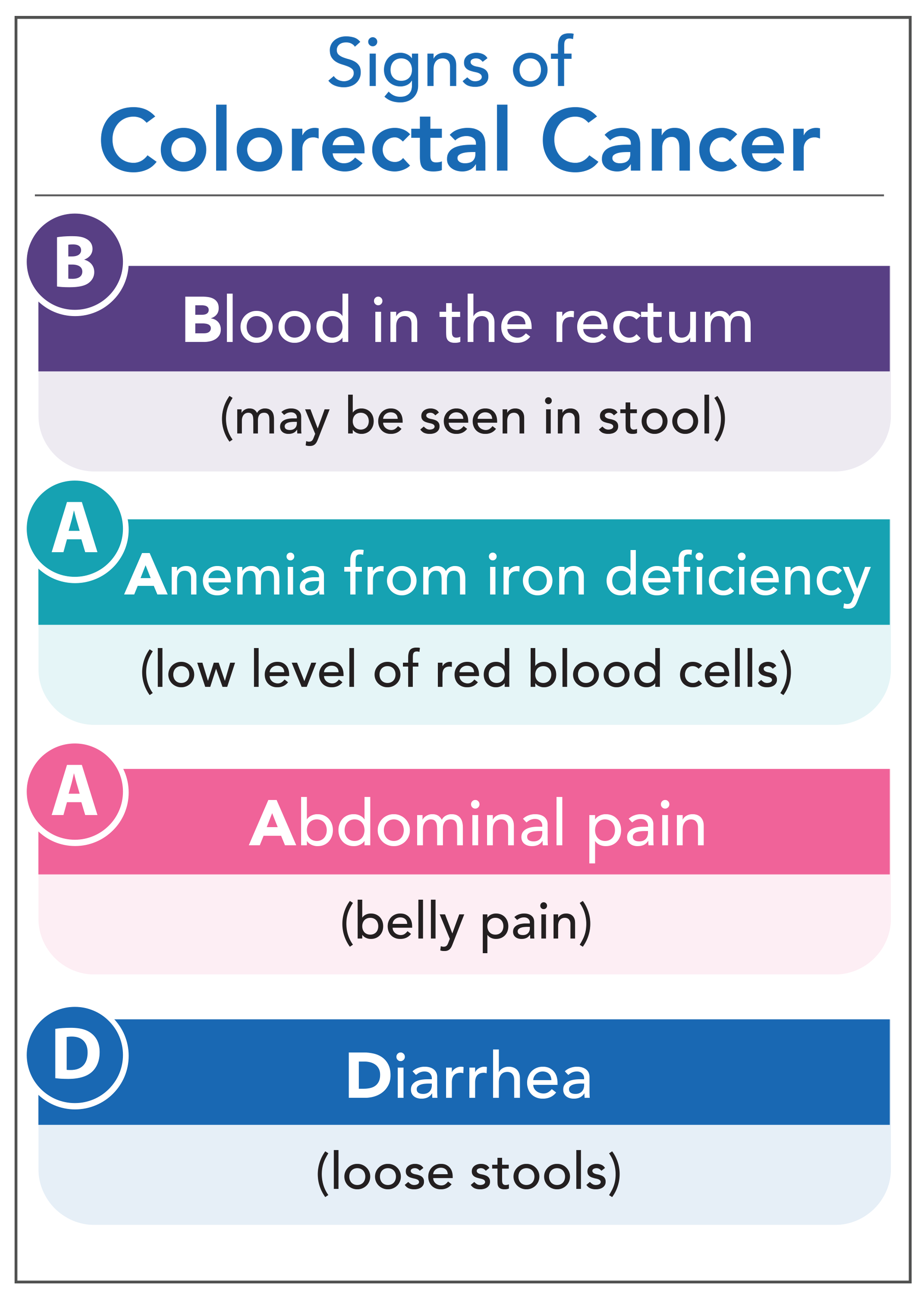Article: Red flags for colorectal cancer in young adults
The rate of colorectal cancer in young adults has been increasing. Researchers in this study identified four signs or “red flags” for colorectal cancer before age 50 (considered to be early onset colorectal cancer). Recognizing these red flags can help diagnose and treat colorectal cancer earlier. (Posted 10/23/23)
Este artículo está disponible en español.

RELEVANCE
Most relevant for: Young adults.
It may also be relevant for:
- healthy people with average cancer risk


Relevance: Medium-High


Strength of Science: Medium-High
What is this article about?
Only a small number of people are diagnosed with colorectal cancer under age 50. However, rates of colorectal cancer in young adults have more than doubled since 1995. The causes for this increase are unknown. Looking at medical records from a large health insurance database, researchers were able to identify four signs (“red flags”) for colorectal cancer in adults under the age of 50.
Why is this article important?
For patients at average risk of colorectal cancer, routine screening is recommended to begin at age 45. However, about half of patients with early-onset colorectal cancer (diagnosed before age 50) develop this cancer before routine screening is recommended. Compared to older patients, younger patients with colorectal cancer are also more likely to be diagnosed when the disease is more advanced and less likely to be curable.
Research on the signs of colorectal cancer has focused on diagnoses after age 50. A better understanding of the signs of early-onset colorectal cancer can lead to earlier diagnosis and improved survival.
You can read more about the rise in colorectal cancer diagnoses in our XRAY review here.
Study findings
For this study, researchers looked at health records from a large US insurance database. Data from more than 5,000 patients with colorectal cancer before age 50 were included. Researchers looked for signs of colorectal cancer within three months to two years prior to a diagnosis.
For comparison, health records for a control group—a group of patients who did not have colorectal cancer but were similar in other ways (age, sex, other health factors)—were also searched for the same signs.
Researchers were able to identify the following four signs that occurred more often in the group of patients with colorectal cancer compared to the group without colorectal cancer:
- rectal bleeding (which may be seen in stool)
- pain in the abdomen (belly)
- diarrhea
- anemia (not having enough red blood cells to carry oxygen to tissues), which is found by a blood test

While these symptoms might be due to other underlying conditions, it is important not to ignore these symptoms if they continue. Among these four signs, rectal bleeding was most commonly associated with developing colorectal cancer.
A person’s chance of developing colorectal cancer increased according to the number of symptoms they developed. Having one symptom increased the risk of having CRC two times, while having three or four symptoms increased the risk more than six times.
| Average risk of colorectal cancer by age 50 | Average risk +1 sign | Average risk +2 signs | Average risk +3-4 signs |
| 1-2% | 2-4% | 3.5%-7% | 6.5%-13% |
Some patients experienced long delays from the start of symptoms to diagnosis, especially those with fewer symptoms. This delay in diagnosis in young adults is close to twice the time to diagnosis in older people and may contribute to colorectal cancer in young adults being diagnosed at more advanced stages.
The study researchers concluded that healthcare providers and patients should be aware of these four red flags for colorectal cancer before age 50, especially in patients who may not be having routine screening.
What does this mean for me?
If you are experiencing any of these red flags, talk to your healthcare provider. If your symptoms do not go away, schedule a visit to a .

In addition to the four signs, ask your healthcare provider when and how often you should be screened for colorectal cancer and what type of screening is best for you if you have any of the following risks:
- a family history of colorectal cancer and/or endometrial cancer
- a personal history of colon
- or another gene mutation linked to colorectal cancer
- an inflammatory bowel disease like Crohn’s disease or ulcerative colitis
If you are age 45 or older and have not yet had a colorectal cancer screening, ask your healthcare provider about starting regular screening.
Reference
Fritz CDL, Otegbeye EE, Zong X, et al., Red-flag signs and symptoms for earlier diagnosis of early-onset colorectal cancer. The Journal of the National Cancer Institute; 2023; 115(8):909-916. May 4, 2023.
Disclosure: FORCE receives funding from industry sponsors, including companies that manufacture cancer drugs, tests and devices. All XRAYS articles are written independently of any sponsor and are reviewed by members of our Scientific Advisory Board prior to publication to assure scientific integrity.
Share your thoughts on this XRAY review by taking our brief survey.
posted 10/23/23
The following studies look at colorectal cancer screening or prevention:
- NCT03218423: Longitudinal Performance of Epi proColon (PERT). This study evaluates a blood test for colorectal cancer.
- NCT04940442: Outreach and Choice in Colorectal Cancer Screening. This study compares participation in colorectal cancer (CRC) screening by fecal immunochemical test [FIT] and colonoscopy.
Other colorectal cancer screening and prevention studies may be found here.
Updated: 01/13/2025
The U.S. government and many health organizations have recommendations for colorectal cancer screening and other preventative measures. Recommendations from the American Cancer Society (ACS), the National Comprehensive Cancer Network (NCCN) and the U.S. Preventive Services Task Force () are shown below.
Screening Recommendations
|
|
ACS |
NCCN |
|
|---|---|---|---|
|
Begin routine colorectal cancer screening for people at average risk |
Age 45 |
Age 45 |
Ages 45-49 Age 50 |
|
Discontinue routine screening for those at average risk |
Age 75 |
Age 75 |
Age 75 |
|
Screen adults ages 76-85 based on patient preferences, health status and prior screening history |
Yes |
Yes |
Yes (Grade C) |
|
Advise against colorectal cancer screening beyond 85 years of age |
Yes |
- |
- |
|
Begin routine colorectal cancer screening for people at high risk* |
Before age 45: specific age depends on risk factor |
Before age 45: specific age depends on risk factor |
- |
*Includes people with any of the following: a personal history of colorectal cancer or certain types of polyps; family history of colorectal cancer; personal history of inflammatory bowel disease; or a confirmed or suspected hereditary colorectal cancer syndrome, such as familial adenomatous polyposis (FAP) or .
For people with , gene-specific recommendations vary for frequency and age to start screening for colorectal cancer (see this link for more information).
Colorectal cancer screening tests
Stool‐based tests are performed on a stool (feces) sample to help diagnose conditions affecting the digestive tract, including colorectal cancer. Like most screening diagnostics, the frequency of stool tests varies. Stool tests include:
|
Stool Test |
Recommended frequency |
|
Fecal protein test (FIT) |
Once per year |
|
Fecal blood test (gFOBT) |
Once per year |
|
Fecal test (FIT-DNA) |
Once every 1-3 years |
Structural (visual) examinations look inside the colon and rectum for areas that might be cancerous or have . These include:
|
Structural examinations |
Recommended frequency |
|
Colonoscopy |
Once per 10 years |
|
CT colonography |
Once per 5 years |
|
Flexible sigmoidoscopy |
Once per 5 years |
|
Flexible sigmoidoscopy with FIT |
Flexible Sigmoidoscopy every 10 years plus FIT every year |
Colonoscopy prevents many cases of colorectal cancer by finding and removing abnormalities before they become cancer. Although sigmoidoscopy can also detect and remove , this procedure uses a shorter scope that doesn’t examine the entire colon.
For people at high risk of colorectal cancer, colonoscopy is recommended for cancer screening.
Insurance coverage for screening
Colorectal cancer screenings such as stool-based tests (see descriptions above) beginning at age 45 have been graded "A" or "B" by the U.S. Preventive Services Task Force (). This means that these services effectively detect or prevent the disease.
- The Patient Protection and Affordable Care Act (ACA) requires that most health plans cover 100% of one colorectal cancer screening at its recommended frequency (see colorectal cancer screening tests table below) with no out-of-pocket costs to patients age 45 and older—no matter their risk.
- Medicare beneficiaries—regardless of their age—are allowed one colonoscopy covered at 100% every 6 years for those at average risk and one colonoscopy per 24 months for those at high risk.
- Medicaid coverage of colorectal cancer screening varies by state. Individuals who qualify based on their state’s decision to expand Medicaid under the ACA are entitled to the same screening and preventive services as those who are covered by private insurance.
For individuals with increased risk, certain states require insurance coverage for colonoscopy beyond the requirements of the ACA. Check with your state insurance commission to determine if you live in one of these states.
Updated: 04/08/2025
The following organizations offer peer support services for people with or at high risk for colorectal cancer:
- FORCE peer support
- Visit our message boards.
- Once you register, you can post on the Diagnosed With Cancer board to connect with other people who have been diagnosed.
- Sign up for our Peer Navigation Program.
- Users are matched with a volunteer who shares their mutation and situation.
- Join our private Facebook group.
- Find a virtual or in-person support meeting.
- Join a Zoom community group meeting.
- LGBTQIA
- Men
- American Sign Language
- People of Color
- Visit our message boards.
- Colorectal Cancer Alliance
- AliveAndKickn for people with
Updated: 02/10/2023
The following resources can help you locate an expert near you.
Finding gastroenterologists
- The organization, Collaborative Group of the Americas-Inherited Gastrointestinal Cancer (CGA-IGC) keeps an updated list of hospitals and programs with hereditary gastrointestinal and pancreatic cancer screening programs for high-risk people.
- The American College of Gastroenterology has a search tool to help you find a by specialty.
Other ways to find experts
- The National Cancer Institute (NCI)-designated comprehensive cancer centers deliver cutting-edge cancer care to patients in communities across the United States. Most centers have specialized screening and prevention centers for high-risk people. Find a center near you and learn about its specific research capabilities, programs, and initiatives.
- Register for the FORCE Message Boards to get referrals from other members. Once you register, you can post on the Find a Specialist board to connect with other people who share your situation.
Updated: 04/08/2023